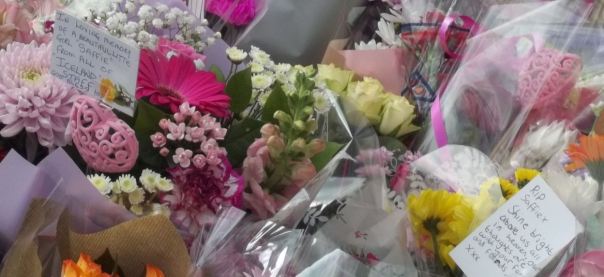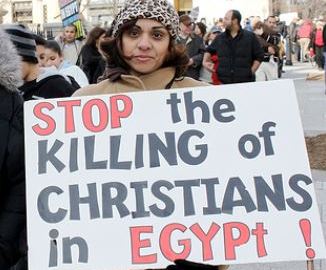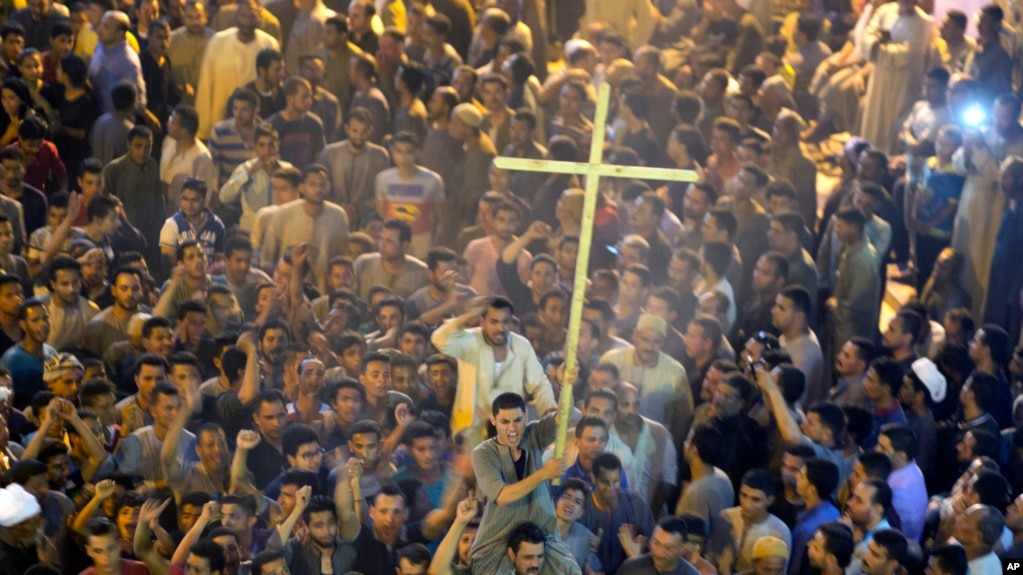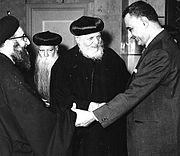Our
‘Favourite Prey’
Spare a thought for the Coptic Christian’s of Egypt & all Christian minority groups throughout the world in these troubled times. Those who live in lands controlled by the Mad Men of Islamic State & their shameful, demonic worldwide Terrorist Franchise are being killed and slaughtered every-single-day. Sadly the world is so busy and overwhelmed by the never ending Terror on our own streets that we hardly seem to notice.
These mad extremists hate us because in their eyes we are “infidels” and they are consumed by their deluded , twisted , evil ideology , built on hate , paranoia and policed by the dark arts of the wicked Sharia Law.
INFIDEL
ˈɪnfɪd(ə)l/archaicnounplural noun: infidels
The events in Manchester this week has shocked and sicken all decent people the world over and the sad fact is we are now living in a new age off Terrorism , where there are no longer ANY Boundaries , both ethically and demographically and the slaughtered of the most vulnerable and young among us is no longer sacred.
Islamic Extremists seem to permeate & engulf our daily lives and sadly they aren’t going to go away any time soon.
Like many I have shed tears for the victims of this unspeakably evil act and watching their families on the TV and their emotional agony breaks my heart every single time.
Saffie Rose Roussos
The beautiful angelic little Saffie Rose Roussos

The family and I have been down every day to pay our respects and silent contemplation
The victims in Egypt are also victims of this modern curse and my thoughts and prayers are with their families.
We are all “Prey” to these Islamic Monsters and someway , somehow we have to destroy this hate filled twisted ideology and eradicate it and all its followers from the history of the mankind.
Coptic Christian attack:
ISIS claims its ‘soldiers’ opened fire on bus killing 29 in Egypt
An Islamic State affiliate released a video Monday vowing that Egyptian Christians are their “favourite prey,” showing images of a suicide bomber who killed nearly 30 people inside a packed Cairo church in December.
“God gave orders to kill every infidel,”
one of the militants carrying an AK-47 assault rifle says in the 20-minute video.
BOMBING OF COPTIC CHURCH IN EGYPT UNDERSCORES LONG HISTORY OF OPPRESSION OF CHRISTIANS
The video shows footage of Egypt’s Coptic Christian Pope, Christian businessmen, judges and priests who either speak of the need to protect the minority or use derogatory terms to refer to Egypt’s Muslim majority. The narrator says Christians were no longer “dhimmis,” a reference to non-Muslims in Islam who enjoy a degree of state protection. Instead, the group describes the Christians as “infidels” who are empowering the West against Muslim nations.
Abu Abdullah al-Masri
The video shows footage of Abu Abdullah al-Masri, a masked militant who blew himself up at the central Cairo church in December, killing 28 people, most of which were women and children. The attack, says a narrator, was “only the beginning.
AMERICAN TROOPS IN IRAQ OPERATING CLOSER TO FRONT LINES
“Oh worshippers of the cross … the soldiers of the state are watching you,” another masked militant identified as Abu Zubair al-Masri says.
ISIS claimed responsibility for the church bombing, which was its deadliest attack in Egypt outside the Sinai Peninsula, according to Reuters. Prior to the attack, Abu Abdullah al-Masri had been detained for two months in 2014 before joining Wilayat Sinai, the name of the ISIS branch in Sinai, the Egyptian government said.
Wilayat Sinai has claimed responsibility for dozens of suicide bombings and attacks, mainly targeting security forces and military across the country but primarily in Sinai Peninsula, where the army has been leading an anti-terrorism operation for years.
——————-
Copts in Egypt
| Total population | |
|---|---|
| 9 to 15 million | |
| Languages | |
| Religion | |
| Coptic Orthodox Church of Alexandria |
Copts in Egypt refers to Coptic people born in or residing in Egypt.
Coptic people are the largest ethno-religious minority in Egypt. The largest Coptic Christian group in Egypt is the Coptic Orthodox Church with a population of at least 7,200,000 and the second is the Coptic Catholic Church with a population of 161,000
Other estimates of the ethnic Coptic population within Egypt range between 9 and 15 million.
History
Under Muslim rule, the ethnic Copts were cut off from the mainstream of Christianity, and were compelled to adhere to the Pact of Umar covenant, thus assigned to Dhimmi status. Their position improved dramatically under the rule of Muhammad Ali in the early 19th century. He abolished the Jizya (a tax on non-Muslims) and allowed ethnic Copts to enroll in the army. Pope Cyril IV, 1854–61, reformed the church and encouraged broader Coptic participation in Egyptian affairs. Khedive Isma’il Pasha, in power 1863–79, further promoted the Copts.
He appointed them judges to Egyptian courts and awarded them political rights and representation in government. They flourished in business affairs.
Some ethnic Copts participated in the Egyptian national movement for independence and occupied many influential positions. Two significant cultural achievements include the founding of the Coptic Museum in 1910 and the Higher Institute of Coptic Studies in 1954. Some prominent Coptic thinkers from this period are Salama Moussa, Louis Awad and Secretary General of the Wafd Party Makram Ebeid.
In 1952, Gamal Abdel Nasser led some army officers in a coup d’état against King Farouk, which overthrew the Kingdom of Egypt and established a republic. Nasser‘s mainstream policy was pan-Arab nationalism and socialism. The ethnic Copts were severely affected by Nasser’s nationalization policies, though they represented about 10–20% of the population.
In addition, Nasser’s pan-Arab policies undermined the Copts’ strong attachment to and sense of identity about their Egyptian pre-Arab, and certainly non-Arab identity which resulted in permits to construct churches to be delayed along with Christian religious courts to be closed.
Pharaonism
Many Coptic intellectuals hold to “Pharaonism,” which states that Coptic culture is largely derived from pre-Christian, Pharaonic culture, and is not indebted to Greece. It gives the Copts a claim to a deep heritage in Egyptian history and culture. Pharaonism was widely held by Coptic and Muslim scholars in the early 20th century, and it helped bridge the divide between those groups. However, some Western scholars today argue that Pharaonism was a late development shaped primarily by Orientalism, and doubt its validity.
Persecution and discrimination in Egypt
Religious freedom in Egypt is hampered to varying degrees by discriminatory and restrictive government policies. Coptic Christians, being the largest religious minority in Egypt, are also negatively affected. Copts have faced increasing marginalization after the 1952 coup d’état led by Gamal Abdel Nasser. Until recently, Christians were required to obtain presidential approval for even minor repairs in churches.
Although the law was eased in 2005 by handing down the authority of approval to the governors, Copts continue to face many obstacles and restrictions in building new churches. These restrictions do not apply for building mosques.
The Coptic community has been targeted by hate crimes resulting in Copts being victims of murder by Islamic extremists. The most significant was the 2000–01 El Kosheh attacks, in which Muslims and Christians were involved in bloody inter-religious clashes following a dispute between a Muslim and a Christian.
“Twenty Christians and one Muslim were killed after violence broke out in the town of el-Kosheh, 440 kilometres (270 mi) south of Cairo”.
International Christian Concern reported that in February 2001, Muslims burned a new Egyptian church and the homes of 35 Christians, and that in April 2001 a 14-year-old Egyptian Christian girl was kidnapped because her parents were believed to be harboring a person who had converted from Islam to Christianity.
In 2006, one person attacked three churches in Alexandria, killing one person and injuring 5–16. The attacker was not linked to any organisation and described as “psychologically disturbed” by the Ministry of Interior.
In May 2010, The Wall Street Journal reported increasing waves of mob attacks by Muslims against ethnic Copts. Despite frantic calls for help, the police typically arrived after the violence was over. The police also coerced the Copts to accept “reconciliation” with their attackers to avoid prosecuting them, with no Muslims convicted for any of the attacks.
In Marsa Matrouh, a Bedouin mob of 3,000 Muslims tried to attack the city’s Coptic population, with 400 Copts having to barricade themselves in their church while the mob destroyed 18 homes, 23 shops and 16 cars.
Members of U.S. Congress have expressed concern about “human trafficking” of Coptic women and girls who are victims of abductions, forced conversion to Islam, sexual exploitation and forced marriage to Muslim men.
Boutros Boutros-Ghali is a Copt who served as Egypt‘s foreign minister under President Anwar Sadat. Today, only two Copts are on Egypt‘s governmental cabinet: Finance Minister Youssef Boutros Ghali and Environment Minister Magued George. There is also currently one Coptic governor out of 25, that of the upper Egyptian governorate of Qena, and the first Coptic governor in a few decades. In addition, Naguib Sawiris, an extremely successful businessman and one of the world’s 100 wealthiest people, is a Copt. In 2002, under the Mubarak government, Coptic Christmas (January 7) was recognized as an official holiday.
However, many Copts continue to complain of being minimally represented in law enforcement, state security and public office, and of being discriminated against in the workforce on the basis of their religion. Most Copts do not support independence or separation movement from other Egyptians.
While freedom of religion is guaranteed by the Egyptian constitution, according to Human Rights Watch,
“Egyptians are able to convert to Islam generally without difficulty, but Muslims who convert to Christianity face difficulties in getting new identity papers and some have been arrested for allegedly forging such documents.”
The Coptic community, however, takes pains to prevent conversions from Christianity to Islam due to the ease with which Christians can often become Muslim. Public officials, being conservative themselves, intensify the complexity of the legal procedures required to recognize the religion change as required by law. Security agencies will sometimes claim that such conversions from Islam to Christianity (or occasionally vice versa) may stir social unrest, and thereby justify themselves in wrongfully detaining the subjects, insisting that they are simply taking steps to prevent likely social troubles from happening.
In 2007, a Cairo administrative court denied 45 citizens the right to obtain identity papers documenting their reversion to Christianity after converting to Islam. However, in February 2008 the Supreme Administrative Court overturned the decision, allowing 12 citizens who had reverted to Christianity to re-list their religion on identity cards, but they will specify that they had adopted Islam for a brief period of time.
The Egyptian Census of 1897 reported the percentage of Non-Muslims in Urban Provinces as 14.7% (13.2% Christians, 1.4% Jews). The Egyptian Census of 1986 reported the percentage of Non-Muslims in Urban Provinces as 6.1% (5.7% Christians, 0% Jews). The decline in the Jewish representation is interpreted through the creation of the state of Israel, and the subsequent emigration of the Egyptian Jews. There is no explanation for a 55% decline in the percentage of Christians in Egypt. It has been suggested that Egyptian censuses held after 1952 have been politicized to under-represent the Christian population.
In August 2013, following the 3 July 2013 Coup and clashes between the military and Morsi supporters, there were widespread attacks on Coptic churches and institutions in Egypt by Sunni Muslims. According to at least one Egyptian scholar (Samuel Tadros), the attacks are the worst violence against the Coptic Church since the 14th century.
USA Today reported that “forty churches have been looted and torched, while 23 others have been attacked and heavily damaged”. The Facebook page of the Muslim Brotherhood’s Freedom and Justice Party was “rife with false accusations meant to foment hatred against Copts”, according to journalist Kirsten Powers. The Party’s page claimed that the Coptic Church had declared “war against Islam and Muslims” and that
“The Pope of the Church is involved in the removal of the first elected Islamist president. The Pope of the Church alleges Islamic Sharia is backwards, stubborn, and reactionary.”
On August 15, nine Egyptian human rights groups under the umbrella group “Egyptian Initiative for Personal Rights”, released a statement saying,
In December … Brotherhood leaders began fomenting anti-Christian sectarian incitement. The anti-Coptic incitement and threats continued unabated up to the demonstrations of June 30 and, with the removal of President Morsi … morphed into sectarian violence, which was sanctioned by … the continued anti-Coptic rhetoric heard from the group’s leaders on the stage … throughout the sit-in.
An Egyptian court on February 25, 2016 convicted four Coptic Christian teenagers for contempt of Islam, after they appeared in a video mocking Muslim prayers.
Nearly all Egyptian Christians today are ethnic Copts, adherents of either the Coptic Orthodox Church or other Coptic churches.
Notable Copts in Egypt
- Youssef Wahba
- Boutros Ghali
- Boutros Boutros-Ghali
- Youssef Boutros Ghali
- George Isaac (politician)
- Hany Ramzy
- Naguib Sawiris
- Mounir Fakhry Abdel Nour
- Alber Saber






